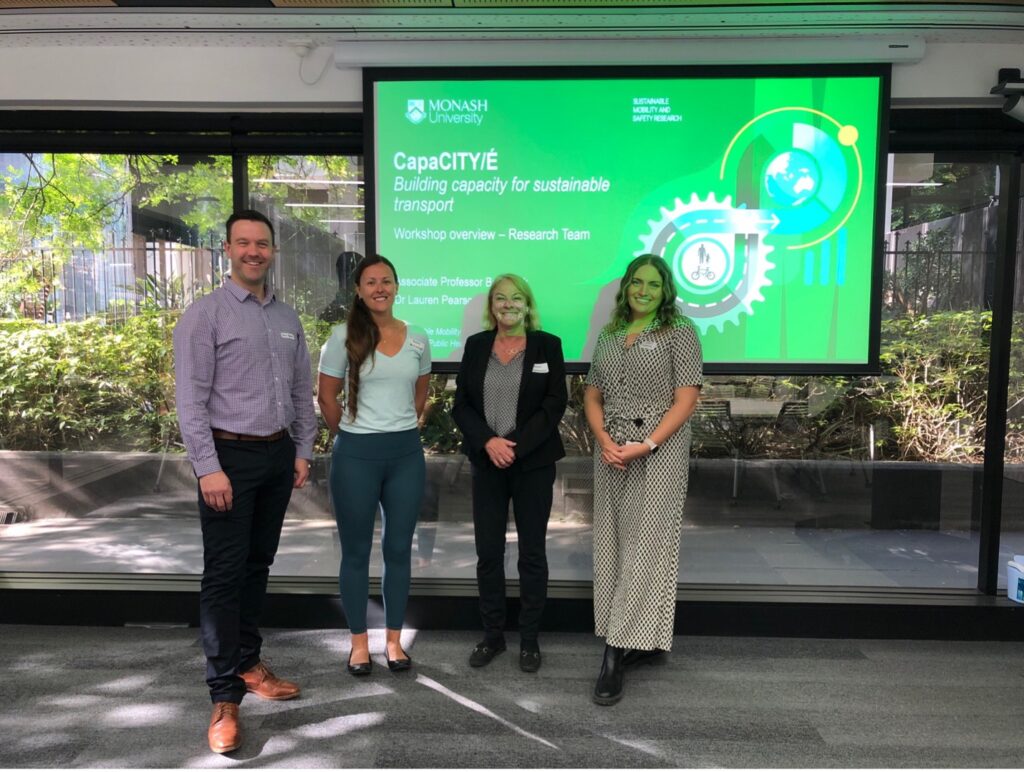York University School of Kinesiology & Health Science Professor Alison Macpherson, and postdoctoral visitor Emily McCullogh, travelled to Monash University in Melbourne, Australia, to collaborate on CapaCITY/É, a joint project focusing on sustainable transportation interventions.
The CapaCITY/É project, funded by the Canadian Institutes of Health Research and Australia’s National Health & Medical Research Council, is comprised of population and public health researchers from 10 jurisdictions across Canada and Australia – including York University.

Its goal is to explore transportation infrastructure with safe and inclusive design to support the uptake of walking, cycling and using public transit. CapaCITY/É will lead analyses of implementation processes and outcomes, health equity and mobility impacts, as well as develop a novel framework to guide this meaningful work across cities and urban environments. All ages and abilities (AAA) infrastructure and speed management investments are key built environment changes that the CapaCITY/É team are looking at.
“Cities that prioritize a safer, more equitable built environment are more likely to have greater uptake of sustainable transportation, and CapaCITY/É will help us to understand ways to achieve this,” Macpherson notes.
Macpherson and McCullogh’s research trip to Australia was motivated by the project’s intent to leverage transportation systems and experts elsewhere to further CapaCITY/É progress. For example, one objective of the project is to develop a novel “skeleton framework,” geared towards implementing sustainable transportation interventions such as AAA infrastructure and speed management strategies. Currently, there are no implementation science frameworks designed specifically for sustainable transportation infrastructure and this work closes this gap. The goal is for the framework to help guide cities as they work to implement these interventions in their specific contexts.
The “skeleton framework,” once developed, will undergo review from other members of the CapaCITY/É team and be refined to reflect, and address, the barriers and enablers for sustainable transportation interventions across Canadian and Australian urban settings.
“Meeting with members of the Australian team certainly strengthens this research,” says York’s McCullogh. “We were able to discuss key differences and similarities between our two road safety contexts that will inform the development of the ‘skeleton framework,’ as well as the other CapaCITY/É objectives.”
“Key to multinational research is intentionally bringing together ideas in a meaningful and applied way,” says postdoctoral Fellow Lauren Pearson from Monash University. “Emily and Alison’s recent trip to Melbourne enabled them to not only embed themselves within our research team, but to gain a thorough understanding into the inner workings and complexities of our transport and public health systems.”
“The partnership between Canadian and Australian researchers, and city partners, is critical to advancing implementation of sustainable transport interventions,” said Associate Professor Ben Beck from Monash, “and our Sustainable Mobility and Safety Research Group at Monash University are delighted to be furthering our deep collaborative relationships with York University and the wider CapaCITY/É team.”
It’s a critical component of the CapaCITY/É project, now in the first of its six-year span, to exemplify interdisciplinary collaboration, as the team consists of researchers with a breadth of expertise in applied public health, preventative medicine, epidemiology, geography, urban planning, political science and sociology.
“Our work is really motivated by what we were hearing from municipal staff and from NGOs who are now an embedded part of the CapaCITY/É team,” says Meghan Winters, the project’s lead principle investigator, from Simon Fraser University. “They wanted to learn more from other cities – what worked, what the barriers were and how they overcame them. Over the next years, these are the conversations we will be hosting.”
Visit the CapaCITY/É website for updates: capacity-capacite.ca.
Posted on yFile.
